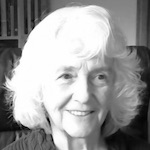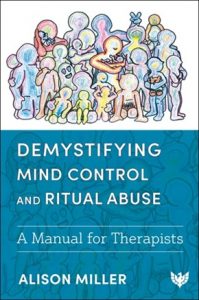
Alison Miller is a retired clinical psychologist, who practised in Victoria, BC, Canada for over forty years, and specialized in work with survivors of ritual abuse and mind control for the last twenty-five years. She is the author of two previous books on that subject, and has contributed to various edited collections and journals.
Alison’s latest book, ‘Demystifying Mind Control and Ritual Abuse: A Manual for Therapists’ is a step-by-step guide for therapists working with survivors of complex mind control and ritual abuse, explaining how survivors were trained and how to help them recover and take control of their own lives.
It was curiosity which led me to the field I ended up in. As a teenager in university I wanted to know “what made people tick.” I began by just listening to people, and this led naturally to helping them discover in the mirror of my attention what they really wanted their lives to be about. I got a Master’s degree in India, with a generous scholarship that paid my way and all my expenses. I became a youth worker in India, then in Canada. But what I offered didn’t work for some people, so I went back to graduate school to learn about these people. Graduate school was a bust in terms of understanding, however, although I did receive what a classmate referred to as a “meal ticket” (that is, a PhD). I did take a very valuable course in scepticism about all the current models which supposedly explained the people I didn’t understand and recommended what to do with such people. The internships in mental hospitals taught me that nobody else understood those people either, and nurses knew better than psychiatrists what they were about.
Then, as a brand new clinical psychologist, I was hired by a government agency to treat children and their families. Family systems theory, attachment theory and family therapy came rushing through the field like whirlwinds, in workshops that provided many of the new insights I needed. I worked happily and effectively in this field for many years – until I once again encountered some clients whom I really didn’t understand (and neither did anyone else, preferring to give them labels and periodically hospitalize them). One other major factor was still not yet recognized: trauma, especially childhood trauma.
Experience had taught me that listening was not only the most effective therapy, it was also the best teacher. I decided to let these clients teach me about themselves. And they did. It started with recognizing what was then called “multiple personality disorder” (MPD). I recognized it first in someone in my personal life, who periodically turned into someone else whose paranoid ideas and violent rage outbursts were completely unrelated to reality. This condition supposedly existed only in novels, notably Dr Jekyll and Mr Hyde, but I had seen the switching process first-hand. And then in my family therapy work, I recognized it in 1990 in a young mother who was obsessed with her “inner child,” a supposed schizophrenic, and a teenage sex offender who handed me a list of the inner identities she had discovered. Listening to these people, I was plunged into a world of horror: childhood rape, Satanism, and widespread organized perpetrator groups who deliberately traumatized children in order to split their identities and turn them into mind-controlled slaves who would never consciously remember what had been done to them. It was a science, involving unethical experimentation.
I was fascinated and appalled. I moved into private practice, and accumulated more such clients, as local therapists were relieved to have someone to send them to, as they had no relevant training or experience. Of course, neither did I. I learned, and I made sense of such things, assisted by several brave clients.
I joined the International Society for the Study of Dissociation (now the International Society for the Study of Trauma and Dissociation) and enjoyed my first conference about “MPD” which was held not far from my home. In the meetings people discussed what they were learning from survivors about these organized abuses. The very next year the ISSD strongly reduced its emphasis on organized abuse, in response to lawsuits and accusations by the newly formed False Memory Syndrome Foundation, which by now has been largely discredited. Those of us who kept doing this work talked in the hallways and over lunch at conferences, exchanged photocopied handouts, and got together online as soon as the Internet was workable. Therapists treating survivors of organized abuse still live in fear of lawsuits or complaints which might put them out of business.
home. In the meetings people discussed what they were learning from survivors about these organized abuses. The very next year the ISSD strongly reduced its emphasis on organized abuse, in response to lawsuits and accusations by the newly formed False Memory Syndrome Foundation, which by now has been largely discredited. Those of us who kept doing this work talked in the hallways and over lunch at conferences, exchanged photocopied handouts, and got together online as soon as the Internet was workable. Therapists treating survivors of organized abuse still live in fear of lawsuits or complaints which might put them out of business.
I waited for twenty years for the book which would explain to me how organized abuser groups trained and controlled their victims, and how to treat these victims. It never arrived, so in 2011 I sat down at my computer and wrote it (Healing the Unimaginable: Treating Ritual Abuse and Mind Control). Two years later I wrote the companion book for survivors, Becoming Yourself: Overcoming Mind Control and Ritual Abuse. Another decade has gone by, and the community of therapists treating survivors has expanded online, while I am getting old and need to pass the baton. The title of my new book, Demystifying Ritual Abuse and Mind Control: A Handbook for Therapists speaks for itself. I am hoping this new book will help new therapists entering this area of practice, as well as reminding experienced therapists of the basics of what they must know to help these terribly abused people recover their lives.
Alison Miller
Pre-order your copy of ‘Demystifying Mind Control and Ritual Abuse: A Manual for Therapists‘ now! Due to be published July 2024.

